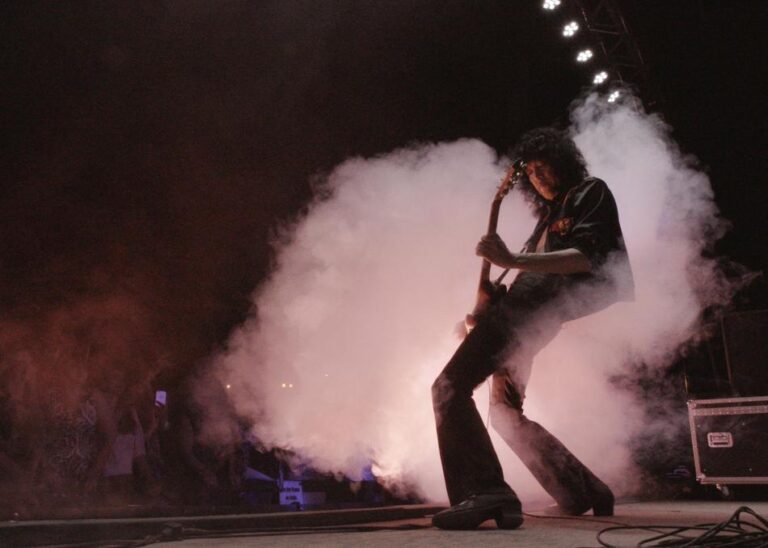In a crowded, dimly lit Tokyo club, a guitarist rips through nearly three hours of Led Zeppelin covers. But the versions of “Stairway to Heaven” and “Dazed and Confused” performed here aren’t the same renditions from the legendary rock band’s studio albums: they’re note-perfect recreations of specific live recordings, complete with extended guitar solos and wild improvisations, and the man bringing it all to life is the subject of SXSW doc Mr. Jimmy.
Since the age of 20, Akio Sakurai has dedicated his life to preserving the musical genius of Led Zeppelin guitarist Jimmy Page. To call Sakurai’s work an obsession would almost be selling it short: he’s memorized the different equipment that Page used during the band’s career, and knows the exact dates when his idol wore specific outfits onstage. He scours live footage for the tiniest details, working with a costume designer to recreate every stitch and seam of Page’s wardrobe, and employs the services of a pickup builder to ensure that each of his guitars can replicate the exact tone required to duplicate a specific era (i.e. “1973” Jimmy).
Not only can he perfectly mimic obscure live arrangements, thanks to countless hours spent listening to bootleg recordings and studying concert vidoes, Sakurai also dresses and moves so much like Page that it’s often easy to forget you’re not watching the real deal. To call it an impersonation feels less than accurate: Sakurai is becoming Page, with performances so convincing they earn him the moniker “Mr. Jimmy.”
Director Peter Michael Dowd crosses paths with Sakurai shortly after Page himself attends a Mr. Jimmy performance in Tokyo, when meeting his idol spurs Sakurai to move to Los Angeles. Joining up with longtime tribute act Led Zepagain, Sakurai is at first delighted to be performing full-time, and then dismayed to learn that his bandmates are more content to deliver a “jukebox” style show of greatest hits, rather than trying to accurately recreate what a real Zeppelin show would have felt like.
Tensions flare, particularly with the group’s Robert Plant stand-in Swan Montgomery, who understands and appreciates Sakurai’s passion, even if he finds it excessive and exasperating. For Montgomery, Led Zepagain is about business, and it shouldn’t matter if he sings “yeah” instead of “ahhh” as long as the audience is shelling out money. But to Sakurai, this kind of cavalier approach is akin to blasphemy: what better way to pay tribute to Led Zeppelin than to honor the true spirit of their live shows? This isn’t just business for him, it’s a way of life.
“There is no ‘me,'” Sakurai tells the camera at one point. “There’s nothing but him.” But the desire to become Page is complicated by Sakurai’s fear that he’ll never be good enough, that ascending to the same heights will always remain nothing more than a dream. “Every time I study a song, I feel like he gets further out of reach.”
At times both inspiring and melancholy, and consistently fascinating, Mr. Jimmy is a compelling look at fandom taken to a degree that most would never even consider. Dowd’s film is as intimate as possible when its subject scarcely has an identity of his own. Whether or not Sakurai is a tragic figure is a subject for further debate, but his singular devotion to an ideal is undeniably admirable, even if we can’t quite make sense of the “why” behind it all.

